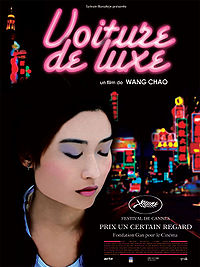
LUXURY CAR
China, 2006, 88 minutes, Colour.
Yuan Tian, You Cai Wu.
Directed by Wang Chao.
Every culture seems to go through a phase as it makes cultural and social transitions, especially as agriculture declines and country townspeople move to the large cities where they find survival is not easy and they get caught up in the squalid side of life. It seems that Chinese films have to deal with these themes now.
A retiring school teacher from the provinces comes to look for his lost son to bring him to see his dying mother. His daughter has moved to Wuhan and, it is soon revealed, is a hostess at a casino and the mistress of the owner. She keeps her father from finding this out. He meanwhile, with the help of a friendly policeman, searches for his son. Complications arise, mainly from the daughter’s lifestyle. These involve rival criminal bosses and their trying to outdo each other, some experiences of violence – and a flashback for the daughter’s and the audience’s benefit (not that of the father) as to what has happened to the son.
The luxury car of the title is both real and symbolic as it turns up in the latter part of the film.
As with so many films in this genre, the heroine has to discover suffering of her ways, has to be disillusioned by what she has experienced in the wicked city and return home. This one has a brief but nice optimistic ending.
1.The impact of the film in terms of emotion? Social themes?
2.The title, the appearance of the luxury car towards the latter part of the film, a stolen car, used by the gangster, the place where the young man died? The policeman riding in it – and his death? The resolution of the film?
3.The Chinese settings, Wuhan, the modern city? Apartments, the streets, casinos and clubs? The musical score?
4.The familiarity of the film: people coming from the country, swallowed up by the city, getting unsavoury jobs, caught in the sex and violence? The search by the older generation from the country for their lost children? The pessimism of the story? The touch of hope at the end – and the birth of the child?
5.The portrait of the father, the teacher, his sick wife, wanting to fulfil her dying wish, to find his son? Meeting his daughter at the station? The apartment? The girl sharing her room – and her dress, drying clothes etc? Whether he realised what his daughter was doing or not? His going to the police, the friendly policeman? Their search, going to the building site, showing the photos? A clue that the boy had gone to another city? The old man’s appreciation of the policeman? His hosting him to the dinner and proud of the stew? The meeting of the boyfriend? His suspicions – or not? His return to the country, teaching, his daughter’s return and his joy in seeing her? The birth of the child and the final image of his joyful face?
6.The daughter, in the city, meeting her father, more sophisticated, his not recognising her at first? Sharing the apartment? Weary from work, asleep in the public transport? The revelation of what she did? Seeing her at the table with the gang boss, the boss asking for her, the eruption? With the boss? Her pregnancy? His decision to show her father the city, the graciousness of the tour? The meal, the revelation about her brother, learning his story? Her being slashed at the club? Her return, drinking for the young hostess? Her return to the country, the memories of her brother on the swing, talking to her father, giving birth to the child?
7.The gangster, his being a boss, his past story, in prison and released? The policeman recognising him, their discussion? His relationship with the girl, the pregnancy and his accepting it? His telling the story of the young man, the stealing of the car, his being hit, his death in the car? The crash with the policeman? The criminal mind in China today?
8.The policeman, genial, helping in the search, recognising the criminal, questioning him, his death?
9.Conventional material – but within a Chinese setting?